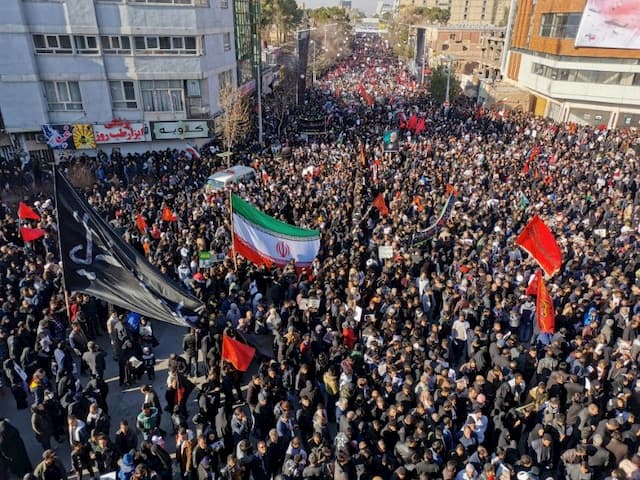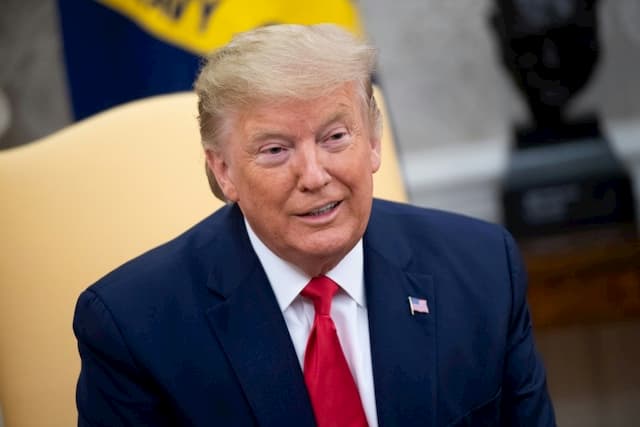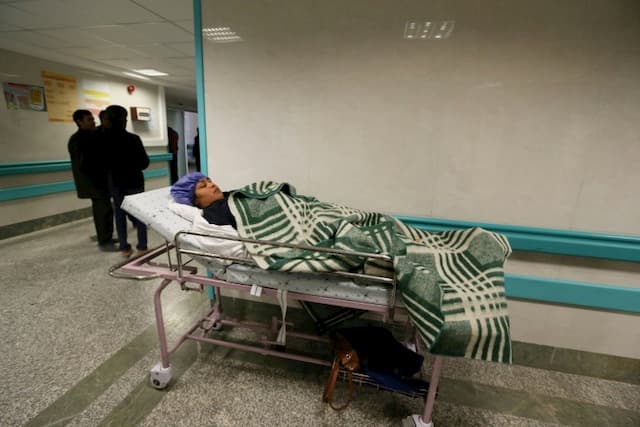Iran Fires Missiles at Two US Bases in Iraq

On Wednesday 8th January 2020, Iran conducted and “completed” “proportionate” reprisals against the United States to avenge the death of General Qassem Soleimani.
Five days after the elimination of General Qassem Soleimani by the United States, Iran retaliated Wednesday 8th January 2020 by firing missiles against two bases sheltering American soldiers in Iraq.
22 missiles were launched from Iran against the bases of Ain al-Assad and Erbil.
The following statement is attributed to @ChiefPentSpox: At approximately 1730 EST on Jan. 7, Iran launched at least a dozen ballistic missiles against U.S. military & coalition forces in Iraq.
— Department of Defense 🇺🇸 (@DeptofDefense) 8 January 2020
These raids, claimed by Tehran, mark a turning point making fear a regional escalation or an open conflict, even if American and Iranian leaders quickly seemed to want to calm the game.
In a particularly light and rather soothing tweet, US President Donald Trump said he would make a statement Wednesday morning and hinted that the balance sheet was not very heavy. “The damage and casualty assessment is underway. So far, so good! “, He launched.
All is well! Missiles launched from Iran at two military bases located in Iraq. Assessment of casualties & damages taking place now. So far, so good! We have the most powerful and well equipped military anywhere in the world, by far! I will be making a statement tomorrow morning.
— Donald J. Trump (@realDonaldTrump) 8 January 2020
“Proportional” retaliation
For his part, Mohammad Javad Zarif, head of Iranian diplomacy, said that his country had led and “finished” during the night of “proportionate” reprisals. “We are not looking for escalation or war,” he insisted.
The US Federal Aviation Agency (FAA) has banned American civil aircraft from flying over Iraq, Iran and the Gulf.
Oil prices soared more than 4.5% Wednesday morning in trade in Asia.
The Iranian Revolutionary Guards, the ideological army of the Islamic Republic, advised Washington to recall its troops deployed in the region “to avoid further casualties,” and threatened to strike Israel and “allied governments” from America.
A new phase
The shooting comes just after the funeral of General Qassem Soleimani, who was assassinated on Friday in Baghdad with the Iraqi Abu Mehdi al-Mouhandis, leader of pro-Iran paramilitaries now integrated into the Iraqi security forces, has just ended.
“Ballistic missiles openly launched from Iran on American targets is a new phase,” said Phillip Smyth, a specialist in armed Shiite groups, recalling that Tehran has tended to respond via factions until now, without claims. .
If Donald Trump clearly dismissed Tuesday any intention to leave Iraq, some of the United States’ western allies have announced their partial military withdrawal, fueling fears that current tensions will undermine the anti-Jihadist struggle.

A withdrawal of American troops “would be the worst thing that could happen to Iraq,” said the White House tenant, referring to the danger he sees for the imposing Iranian neighbour.
“At some point, we will leave,” “but this moment has not come,” he said.
🔴 L’Iran riposte à coups de missiles contre deux bases américaines en Irak, 5 jours après la mort du général Soleimani pic.twitter.com/h30xpUcrYE
— BFMTV (@BFMTV) 8 January 2020
“We are not leaving Iraq”
Almost at the same time, its Minister of Defense Mark Esper hammered, during a press conference, that the American policy had “not changed”: “We do not leave Iraq”.
“We are not looking to start a war with Iran, but we are prepared to finish one,” US Defense Secretary Mark Esper tells @camanpour.
“…What we would like to see is the situation de-escalated and for Tehran to sit down with us and begin a discussion about a better way ahead.” pic.twitter.com/QGxdB5AbIH
— CNN International (@cnni) 7 January 2020
The Trump administration had created confusion on Monday by mistakenly transmitting to the Iraqi authorities a letter announcing preparations for the withdrawal of their soldiers. The letter referred to a vote by the Iraqi parliament which on Sunday urged its government to expel foreign troops from Iraq after the anger over the elimination of Soleimani.
Sign of a dialogue of the deaf which could continue, the Iraqi prime minister resigned Adel Abdel Mahdi confirmed Tuesday it had received a letter “signed” and “clear” the US command announcing a military withdrawal.
Huge crowd in Kerman
And to add to the climate of uncertainty, the international coalition against the jihadist group Islamic State (IS) displays first cracks.
If France and Italy have announced their intention to stay in Iraq, the Canadians and the Germans announced Tuesday the redeployment of part of their soldiers to Jordan and Kuwait. NATO has decided to temporarily withdraw part of its personnel from Iraq.
After the real-fake total withdrawal of American troops from Syria, announced by Donald Trump twice in the past year before he turned around, this is another blow to the fight against IS , while experts continue to warn against a resurgence of jihadist group despite the elimination of his “caliphate” territorial Iraqi-Syrian.
The death of General Soleimani while in Baghdad therefore continues to make waves.
During the tribute to Kerman, his hometown of southeastern Iran, a huge crowd demanded revenge for the cries of “Death in America,” as when his coffin staged Sunday and Monday in Tehran. and in other Iranian localities.
But a stampede left 56 dead and 213 injured, according to the latest official report published by local media.
According to the Iranian agency Fars, Qassem Soleimani was buried overnight.
” Respect the law “
The Iranian parliament passed emergency legislation classifying all US armed forces as “terrorists” after the death of the architect of Iran’s strategy in the Middle East, often considered a hero in his country for the fight against EI.
But when he personally threatened to hit Iranian cultural sites in the event of a military response from Tehran, Donald Trump backed down. “According to various laws, we are supposed to be careful with their cultural heritage,” he said, before assuring: “I like to respect the law”.
The debate is already raging, in the United States and beyond, on the very legality of the strike to eliminate Soleimani, which is more in a third country. President Trump “absolutely had the proper legal basis,” said Secretary of State Mike Pompeo.
In this tense context, Mohammad Javad Zarif, who was to attend a meeting of the Security Council at the UN in New York on Thursday, said that he had been informed by the head of the United Nations that the United States had refused his visa.

Enjoyed this? Get the week’s top France stories
One email every Sunday. Unsubscribe anytime.


